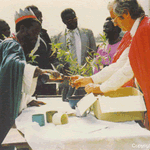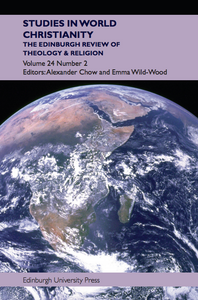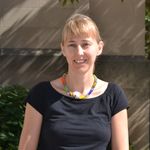African Initiatives

Boston University hosts the second oldest African Studies Center in the United States, and is recognized by the federal government for its excellence in the study of African languages and cultures. The School of Theology is a vital component of African Studies at Boston University, beginning with the sending of graduates to Africa as missionaries over a century ago. Important African alumni include Bishop Josiah Kibira (1964 graduate), the first African head of the Lutheran World Federation; Dr. Kenaleone Ketshabile, Head of the Mission Desk, Methodist Church of Southern Africa; Yusufu Turaki, Professor and former General Secretary of the Evangelical Church of West Africa; and Professor Emmanuel Anyambod, Rector of the Protestant University of Central Africa.

Africa research in the CGCM grows from the work of retired Professor M.L. “Inus” Daneel. His over forty-year presence among African Initiated Churches in Zimbabwe culminated in the 1990s with the largest tree-planting movement in southern Africa, and a program in Theological Education by Extension. The son of missionary parents, Daneel served as a missionary of the Dutch Mission Councils, and then as professor of African theology and missiology at the University of South Africa. He and Professor Robert co-edit the African Initiatives in Christian Mission Series, published by the University of South Africa Press. The goal of the series is to reflect upon contemporary African Christianity, and to document its expansion. Other Africa projects include the digitization of Daneel’s photography and publications on the multimedia site Old & New In Shona Religion, and ongoing research into southern African traditions of earth-care.
See also the Dictionary of African Christian Biography (DACB) listed under Digital Projects.
Dr. Marthinus Daneel, Africa Research Director
African Initiative and Inspiration in the East African Revival, 1930-1950

In the 1930s and 1940s, African revivalists in colonial Ugandan and Ruanda-Urundi appropriated Christian beliefs and practices to forge a distinctively African Christian spirituality that precipitated the moral and spiritual transformation of many people in East Africa. Daewon Moon, in his successfully defended dissertation, demonstrated that African revivalists had the support and sympathy of evangelical-minded missionaries, but it was African evangelists, teachers, and hospital workers who fueled the rapid expansion of the movement.
Colonialism, Christianity, and Personhood in Africa
 "Africans labor under the weight of a crisis of personhood, self-identity, and a split self that is a legacy of Christianity and colonialism," Nimi Wariboko argues. In his recent publication, "Colonialism, Christianity and Personhood," which appears in the Blackwell Companion to African History, edited by William H. Worger, Charles Ambler and Nwando Achebe, Wariboko explores the dual nature of African identity, its source in African tradition and Western colonialism and the spread of Christianity. He ends in hopeful expectation that the twin forces within the African self will no longer stand in opposition to one another, but begin to create a new combination.
"Africans labor under the weight of a crisis of personhood, self-identity, and a split self that is a legacy of Christianity and colonialism," Nimi Wariboko argues. In his recent publication, "Colonialism, Christianity and Personhood," which appears in the Blackwell Companion to African History, edited by William H. Worger, Charles Ambler and Nwando Achebe, Wariboko explores the dual nature of African identity, its source in African tradition and Western colonialism and the spread of Christianity. He ends in hopeful expectation that the twin forces within the African self will no longer stand in opposition to one another, but begin to create a new combination.
Business and Mission in 19th Century Africa
 The "Impact of Business Practices and Ethos on Mission," cannot be ignored, Nimi Wariboko argues in his recent publication on "Liverpool Merchants in 19th-century Niger Delta." It is an extension of his ongoing work on the intersection between Christianity and economics.
The "Impact of Business Practices and Ethos on Mission," cannot be ignored, Nimi Wariboko argues in his recent publication on "Liverpool Merchants in 19th-century Niger Delta." It is an extension of his ongoing work on the intersection between Christianity and economics.
Testimony and Fellowship
 The East African Revival emphasized the so-called conversion experience, including an individual's conviction of sin and experience of forgiveness. The revivalists asserted that evidence of one's conversion would be – and had to be – discernable at both the personal level and the communal level. Daewon Moon (projected '18) argues in his latest article that one distinctive feature of the Revival was that in revival meetings or marketplaces, converts shared testimony that re-enacted their original conversion experiences, in order to demonstrate the genuineness of their conversion and maintain its continuing efficacy in their daily lives. A second distinctive feature of the Revival was its strong focus on fellowship with other converts. Structured opportunities for fellowship facilitated the ongoing process of identity reorientation and provided a safe, embracing environment in which new converts could receive spiritual and practical support from other members of the Revival. This article examines the significant roles of fellowship and testimony in the East African Revival and how they upheld the authenticity of a person's initial conversion experience while also cultivating ongoing conversion through involvement in this new religious community.
The East African Revival emphasized the so-called conversion experience, including an individual's conviction of sin and experience of forgiveness. The revivalists asserted that evidence of one's conversion would be – and had to be – discernable at both the personal level and the communal level. Daewon Moon (projected '18) argues in his latest article that one distinctive feature of the Revival was that in revival meetings or marketplaces, converts shared testimony that re-enacted their original conversion experiences, in order to demonstrate the genuineness of their conversion and maintain its continuing efficacy in their daily lives. A second distinctive feature of the Revival was its strong focus on fellowship with other converts. Structured opportunities for fellowship facilitated the ongoing process of identity reorientation and provided a safe, embracing environment in which new converts could receive spiritual and practical support from other members of the Revival. This article examines the significant roles of fellowship and testimony in the East African Revival and how they upheld the authenticity of a person's initial conversion experience while also cultivating ongoing conversion through involvement in this new religious community.
Sacred Children and Colonial Subsidies
 Anicka Fast, CGCM student affiliate, recently published an article entitled "Sacred children and colonial subsidies: The missionary performance of racial separation in Belgian Congo, 1946-1959" in Missiology: An International Review. Below is the description of the article:
Anicka Fast, CGCM student affiliate, recently published an article entitled "Sacred children and colonial subsidies: The missionary performance of racial separation in Belgian Congo, 1946-1959" in Missiology: An International Review. Below is the description of the article:
While most Protestant missions in Belgian Congo gladly accepted the colonial state’s offer of educational subsidies in 1946, a strong emphasis on church-state separation led the American Mennonite Brethren Mission (AMBM) to initially reject these funds. In a surprising twist, however, the AMBM reversed its position in 1952. Through archival research, I demonstrate that a major factor that led the AMBM to accept subsidies was the creation and institutionalization of a racially separate ecclesial identity from that of Congolese Christians. This was epitomized in the missionaries’ vision for a “white children’s school,” geographically separated from their work with Congolese. The enactment of white identity helped pave the way for the acceptance of subsidies, both by bringing the missionaries more strongly into the orbit of the colonial logic of domination, and by clarifying the heavy cost of failing to comply with the state’s expectations.